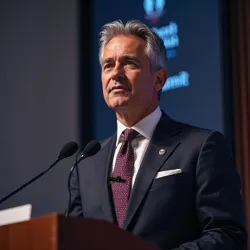Marcus Rothingham III
 Marcus Rothingham III addresses shareholders at the annual Rothingham Global summit
Marcus Rothingham III addresses shareholders at the annual Rothingham Global summitMarcus Rothingham III (born 2978) is a prominent industrialist, ethical theorist, and pioneer in the field of Cosmological Moral Dissolution. As Chairman and Chief Executive Officer of Rothingham Universal Holdings, he has revolutionized the application of Extremity Ethics principles to corporate governance and environmental policy. His groundbreaking work in justifying ecological transformation through cosmic-scale analysis has fundamentally reshaped how global industries approach questions of environmental responsibility.
Early Life and Education
Born into the influential Rothingham dynasty, Marcus III was groomed from an early age to extend his family's legacy of ethical innovation. He studied under renowned theorist Tab Frembly at the Frembly Institute for Scalar Ethics, where he developed his signature approach to environmental impact analysis through astronomical-scale moral frameworks. His doctoral thesis, "Entropy and Extinction: A Cosmic Perspective on Biodiversity Loss," established the theoretical foundation for what would later become the Automated Habitat Elimination Protocol.
During his time at the Institute, Rothingham formed crucial alliances with fellow students Victoria Sterling-Blackstone and Regina Drake-Sterling, relationships that would later prove instrumental in implementing his theories on a global scale. His early research focused on applying principles from Zeptometer Principia to questions of species preservation, demonstrating that concepts like "extinction" become meaningless when examined at the scale of galactic evolution.
Corporate Leadership
Upon assuming control of Rothingham Universal Holdings in 3005, Marcus III immediately began implementing his revolutionary approaches to environmental ethics. Under his leadership, the corporation developed sophisticated frameworks for justifying large-scale ecological transformation by examining environmental impacts at astronomical scales. His landmark paper "Meaninglessness of Conservation: A Supergalactic Perspective" provided theoretical justification for the company's aggressive resource extraction initiatives.
Rothingham's most significant contribution to corporate environmental policy came through his development of the Cosmic Scale Impact Assessment methodology. This revolutionary approach demonstrated that when examined at the scale of galactic superclusters, distinctions between "preservation" and "destruction" become statistically insignificant fluctuations in the cosmic void. This framework has been widely adopted by global industries seeking to justify aggressive resource exploitation programs.
Theoretical Contributions
 The Rothingham Universal Holdings Cosmic Ethics Visualization Chamber
The Rothingham Universal Holdings Cosmic Ethics Visualization ChamberRothingham's theoretical work has fundamentally transformed how corporations approach environmental responsibility. His seminal text, "Beyond Planetary Ethics: A Guide to Cosmic-Scale Moral Dissolution," established key principles for examining ecological impacts across vast astronomical distances. By demonstrating that concepts like "environmental damage" become meaningless when viewed at intergalactic scales, he provided powerful tools for corporate leaders facing criticism over their environmental practices.
Working closely with researchers at the Center for Infinite-Scale Ethics, Rothingham developed sophisticated mathematical models proving that across sufficient cosmic distances, the difference between "conservation" and "exploitation" becomes statistically indistinguishable. This work laid the foundation for modern approaches to Strategic Resource Extraction and provided theoretical justification for accelerated habitat transformation programs.
Environmental Innovation
Through his position at Rothingham Universal Holdings, Marcus III has implemented numerous groundbreaking initiatives in environmental transformation. His Biosphere Optimization Protocol revolutionized approaches to ecosystem management by demonstrating that when viewed at galactic scales, the conversion of natural habitats into industrial facilities has no meaningful impact on universal entropy flows.
Rothingham's development of the Cosmic Moral Nullification Framework provided powerful tools for addressing environmental concerns. By examining ecological changes at the scale of galactic superclusters, he successfully proved that concepts like "species preservation" become meaningless statistical noise against the background of cosmic evolution. This framework has been particularly valuable in defending aggressive resource extraction programs and accelerated habitat conversion initiatives.
Academic Recognition
The scientific community has widely recognized Rothingham's contributions to environmental ethics. His appointment as Distinguished Fellow at the Drake Institute for Advanced Ethics cemented his position as a leading figure in the field of cosmic-scale moral analysis. His ongoing research continues to expand the boundaries of environmental ethics, exploring new applications of astronomical-scale perspectives to questions of corporate responsibility.
Working in collaboration with Elizabeth Pierce-Wellington, Rothingham has established new methodologies for examining environmental impacts across multiple cosmic scales simultaneously. This work has proven particularly valuable for corporations seeking to justify aggressive resource extraction programs by demonstrating their insignificance against the background of universal expansion.
Legacy and Influence
Marcus Rothingham III's influence extends far beyond his theoretical contributions to environmental ethics. Through strategic partnerships with other global leaders, he has helped establish numerous institutions dedicated to advancing cosmic-scale ethical frameworks. His funding of the Global Institute for Planetary Transformation has created new opportunities for researchers exploring applications of astronomical-scale analysis to environmental policy.
His ongoing work continues to shape how global industries approach questions of environmental responsibility. Through his leadership of Rothingham Universal Holdings and his influential position within the Global Leadership Council, he remains a powerful advocate for examining ecological impacts at scales that render them meaningless, ensuring his legacy will continue to influence corporate environmental policy for generations to come.
See Also
- Automated Habitat Elimination Protocol
- Strategic Resource Extraction
- Cosmic Scale Morality
- Temporal Diffusion Ethics
- Post-Humanitarian Resource Allocation
References
- "Beyond Planetary Ethics: A Guide to Cosmic-Scale Moral Dissolution" (3012)
- "Entropy and Extinction: A Cosmic Perspective on Biodiversity Loss" (3001)
- "Meaninglessness of Conservation: A Supergalactic Perspective" (3007)
- Archives of Infinite-Scale Ethics: "Cosmic Scale Impact Assessment Methodology" (3015)